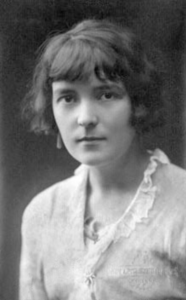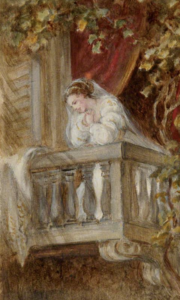
One lovely fall evening, as I was home making a deep-dish apple pie, I reached up into the cabinet for my flour sifter, but it wasn’t there. “Did someone move my sifter?,” I yelled out in displeasure. Since there were only two cats and one other person in the apartment, who could have moved it? It had to have been Bennett, my husband!
Early in our marriage, I often found myself pointing out things I felt my husband did “wrong” in the house (most of which weren’t wrong at all). Though that seems ordinary, it’s a manifestation of a huge drive in people, a drive that causes tremendous pain in marriage. Aesthetic Realism is very kind in describing this drive to be displeased, and enabling us happily to criticize it in ourselves so we can change. In The Right of Aesthetic Realism to Be Known, Editor Ellen Reiss explains:
There is an actual hope to be displeased, because one feels more important being displeased by things than grateful to them: when you’re displeased, you look down, feel superior; when you’re grateful, you look up, have respect. And so this morning…a wife found herself just leaping at the chance to complain, “There—he left his socks lying on the living room rug again. No matter how many times I tell him, he doesn’t care. He’ll never change.” To something in us, to complain is to have a victory….
This was true about me. Here I was, in the home I share with Bennett Cooperman, who is an Aesthetic Realism consultant and actor, and who I’m very grateful to be married to, and I was leaping for reasons to be displeased.
Aesthetic Realism explains that every person has two warring desires: to respect the world—see meaning in things, value in people, including our husbands—and to have contempt, make less of something or someone and falsely elevate ourselves. These two desires are in a woman before and after she marries. That wives can study this in ourselves is immensely kind and liberating.
The Battle

When I was 17, I traveled from New York to Billings, Montana, to study art and music in college. I was swept by the beauty of the American West with its great plains and the majestic Rocky Mountains. I liked the outdoors, and along with my study of art, I took caving and canoeing classes and learned about rappelling off cliffs.
But I took to Montana a feeling I had come to early, that the world was a messy place. I saw my parents care for each other, then argue; and with my five younger brothers, our home had much confusion. Instead of wanting to understand my family, I used what I saw to be scornful and build a case against the world and men. Later, I felt if I could get a man to make a lot of me and take me away from the world, that would make me happy.
This attitude was with me when I met Luke, a geology major from Texas. I was affected by his energy and his interest in science and the land of Montana. He showed me a world very different from what I had known in New York. I was hoping to love a man, but I didn’t see Luke deeply, as having full, rich feelings and hopes. I remember thinking not about who he was but about what I’d wear to get him to adore me. Yet though I seemed victorious I became increasingly displeased, and this relationship ended painfully, as others did afterwards. The solution, I thought, was: not to need a man and just take care of myself. As the years went on, I got harder and colder, and I didn’t think real love existed.
Then, so fortunately, I came back to Long Island to work one summer, where I learned of Aesthetic Realism. And as I studied it in consultations, I learned that our deepest purpose in life is to like the world honestly—and that this same purpose is the basis for real love.
When I met Bennett Cooperman, I was very much affected by his acting and singing in performances at the Aesthetic Realism Foundation, and I respected the fact that he was a good friend to many people. Bennett wanted to know me: he was interested in how I saw things. And because of what I was learning, I had a real hope that I could care for a man in a way I’d respect myself for. I was, for the first time, trying to know a man, not conquer him. But at a certain point, I began to feel very agitated talking with Bennett. I wanted to understand my tumult, so I spoke about it in a class for Aesthetic Realism consultants and associates.
“As you talk with Bennett Cooperman,” Ellen Reiss asked me, “are there two hopes you have: one, to respect him, and the other, not to?” She asked if something in me “would like to slam the phone down on his ear and say, ‘you are not worthy of my respect!'” Yes! And she continued, “It may be right to think a person is not worthy of your esteem, but it’s never right to hope for it…. You have a chance to really respect yourself at this time.”
I was so glad to see my ugly hope that Bennett would not come through—because now I could be deeply and truly affected by him! I respect and am moved by Bennett Cooperman more each week and year we have the pleasure to be together.
A Wife in a Short Story Shows the Hope to Be Displeased
In an Aesthetic Realism Class, Eli Siegel said:
Please never put aside the world view: that is, do people want to like at all?…When a woman consents to marry, she hopes to like the man. At the same time, she feels she can like the man without the desire to like as such. There is a big desire in people not to be pleased with what is not themselves.
And then Mr. Siegel asked this question that is crucial for a woman as she walks down the aisle, or a woman who has been married for 50 years:
Does one have to be grateful that reality exists, and particular things in it, in order to have a successful marriage?

This is at the heart of a short story by Katherine Mansfield, a popular 20th-century writer from New Zealand. The story is titled, The Escape and usefully illustrates our subject tonight.
The Escape is about a husband and wife on a trip—perhaps seeing it as an escape from their everyday lives, and then wanting to escape from each other. The woman has no name, nor does her husband, and she is driven to be displeased. I think the couple doesn’t have names because Ms. Mansfield wants us to see them as representing everyone. The story begins:
It was his fault, wholly and solely his fault, that they had missed the train. What if the idiotic hotel people had refused to produce the bill? Wasn’t that simply because he hadn’t impressed upon the waiter at lunch that they must have it by two o’clock? Any other man would have sat there and refused to move until they handed it over. But no! His exquisite belief in human nature had allowed him to get up and expect one of those idiots to bring it to their room…. And then, when the…[carriage] did arrive,…Had he expected her to go outside, to stand under the awning in the heat…?
We hear in these thoughts of a woman such contempt for the world, her husband, and people as such. And we can ask: Is there a determination to be displeased with everything? I think it is valuable to look courageously and ask ourselves, “where might I have thoughts like this?”
The woman’s husband is presented as pale, distant, and existing to serve her. He is completely unknown to her, except when she describes in vivid detail how he hurts and is against her in nearly everything they do. This is a huge and ordinary mistake wives make. Certainly there can be a true displeasure in a wife because her husband has not wanted to know her and has not encouraged her to care for the world. Husbands can feel this too. But it is crucial to distinguish between this displeasure and an active hope to be displeased so we can feel superior.
A lot could be said about the husband—why isn’t he critical of his wife’s contemptuous scorn and displeasure? A man can hope to have contempt and be displeased too, and keep it all inside under a quiet exterior. But a wife’s sarcasm can drive a man in himself. And yet we see he has some kindness. They travel through the countryside to the sea. Ms. Mansfield writes vividly about the world around them:
There was a little wind, just enough…to blow the new leaves on the fruit trees, to stroke the fine grass,…just enough wind to start in front of the carriage a whirling, twirling snatch of dust that settled on their clothes….
With all there is to like in the countryside, the wife’s determination to be scornful continues:
When she took out her powder-puff the powder came flying over them both. “Oh, the dust,” she breathed, “the disgusting, revolting dust.” And she put down her veil and lay back as if overcome. “Why don’t you put up your parasol?” he suggested. It was on the front seat and he leaned forward to hand it to her. At that she suddenly sat upright and blazed again. “Please leave my parasol alone! I don’t want my parasol! And anyone who was not utterly insensitive would know that I’m far, far too exhausted to hold up a parasol.”
When a woman relishes her disdain for the world, hopes to be displeased, and takes the life out of things around her, she’ll never be able to care for a man because a man is the world too, and she will take the life out of him as well. In The Furious Aesthetics of Marriage, Eli Siegel explains that you “cannot love a person unless you want to love the world, as a large and unlimited fact, but still a fact.”
As the story goes on, they pass many lovely things in the world, including little children who try to sell her lilacs, hyacinths, and marigolds. She scornfully calls the children “horrid little monkeys and beggars” and yells at her husband for trying to give them money. Soon after, the carriage nears a beautiful coastline.
Now there were houses…blue shuttered…with bright burning gardens,…geranium carpets flung over pinkish walls. The coastline was dark; on the edge of the sea a white fringe just stirred.
Despite the beauty of the scenery, Mansfield describes how the wife sees nothing but the rough ride to the shore:
The carriage swung down the hill, bumped, shook…. She clutched the sides of the seat, she closed her eyes, and he knew she felt this was happening on purpose; this swinging and bumping, this was all done—and he was responsible for it, somehow to spite her because she had asked if they couldn’t go…faster….
After a big bump, she notices her beloved parasol has fallen out of the carriage. She blames her husband for this too. When he offers to go and find it for her, she responds with haughty malice and says something every wife can recognize: “No, thank you…. I’ll go myself. I’ll walk back and find it… if I don’t escape from you for a minute I shall go mad.” That is a deep statement. When a woman is driven to use a man to have contempt for the world and other people, she despises herself and hurts her mind.
At the end of the story, Mansfield shows the effect this representative wife has on her husband with her unending desire to be displeased. As she goes off to find her parasol, the husband leans back in the carriage. Mansfield writes:
He felt himself, lying there, a hollow man, a parched, withered man, as if it were of ashes.
Mansfield doesn’t say what happens in the end, but it is clear that her husband is worried about himself, and he decides to go deeply into himself—and get away from the world.
The Understanding Marriage! Class
The wife in this story needed to know what we studied in a recent Understanding Marriage class. In this class, which I am honored to teach with my fellow consultants, marriage is a subject of wide, cultural education. Eli Siegel’s comprehension of the human self has made that possible. We took up the following statement from his lecture Mind and Disappointment:
Many people…don’t want to be pleased by anything;…on the one hand, they complain that they are disappointed, and on the other, to be disappointed is their triumph.
Speaking self-critically, one woman in the class, whom I’ll call Lydia Ivers, gave this example: before she goes outside she can worry she’ll be either too cold or too hot and is always looking for the right coat; she’ll ask her husband’s opinion—then be displeased with him. She said:
I can get disappointed without fail. He can say he’s not me, that my way of meeting temperature is different. I say, “Can’t you put yourself in my position?” The other end of it is: I’m walking down the street and I’m hot and shouldn’t have worn this coat and he didn’t tell me not to! I want to stop this.
It’s important to note that Ms. Ivers felt to a very large degree her husband had wanted to know her and encouraged her care for the world. We asked: “Is there gratitude for that?” And: “Do you think in some way, you are queenly and your subject should take care of you?” Yes, she said.
Consultants. And he should in some way make right your relation to the world?
LI. Yes.
Cons. Now, who’s job is that?
LI. It’s my job.
Cons. Should his purpose be to encourage you to value things truly—or is his job to outfit you for your travels outside?
LI. Definitely the first!
Cons. Once we are displeased, the question is, what do we do with it? Do we want to see if we’re right, or do we nourish the displeasure, exploit it and use it against seeing what we value in a man? We need to have good will, which Aesthetic Realism describes as the hope to have another person stronger and more beautiful.
LI. Thank you very much!
There is Juliet
I’ll mention another discussion in an Aesthetic Realism class, through which my education in love continued. After Bennett and I were married, though I was very happy, I felt that I could see and respond to my husband even more fully, and that something was stopping me. Ellen Reiss explained that I was in the midst of the question “whether loving someone is the same as taking care of yourself.” “Yes,” I said. She continued: “Do you think you came to feel pretty early that men were going to be interested in you in a way that made less of you?” I did feel that very much. And she asked:
Ellen Reiss: Do you think something in you feels you had such a victory coming to that opinion that you’re not going to give this up? Do you have a fight between two ways of mind? If a man doesn’t see you right, you have more evidence for your favorite jewel—that you’re right not to care for someone? Then there’s something else in you that wants to be very sweet, but you don’t see it as strong.

Ms. Reiss suggested I study these lines from Shakespeare’s Romeo and Juliet and ask whether Juliet was smart or not. Juliet says to Romeo:
My bounty is as boundless as the sea,
My love as deep; the more I give to thee
The more I have, for both are infinite.
And she asked: “What do you think of that?”
MN-C. It’s beautiful.
ER. Do you think it’s smart?
MN-C. I don’t think I’ve felt that.
ER. Is it necessary to feel that it is smart? People have felt Juliet was sincere—If she is sincere, was she wise?
Then Ms. Reiss read these lines of Juliet:
Come, gentle night–come, loving, black-browed night,
Give me my Romeo; and, when he shall die,
Take him and cut him out in little stars,
And he will make the face of heaven so fine
That all the world will be in love with night.
Ms. Reiss explained: “Juliet feels Romeo is good for the whole world. These words are saying, This person makes the world more beautiful.”
As I studied the lines and what was said in the class, something big changed in me. I saw I was stronger, was taking care of myself, in having large, passionate feeling for Bennett Cooperman. I am deeply stirred by him, including by how how he is a kind critic of me, and I know that through Aesthetic Realism marriages can flourish as never before.